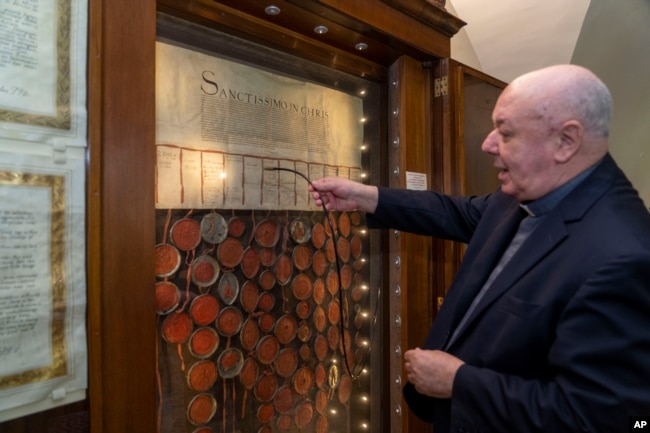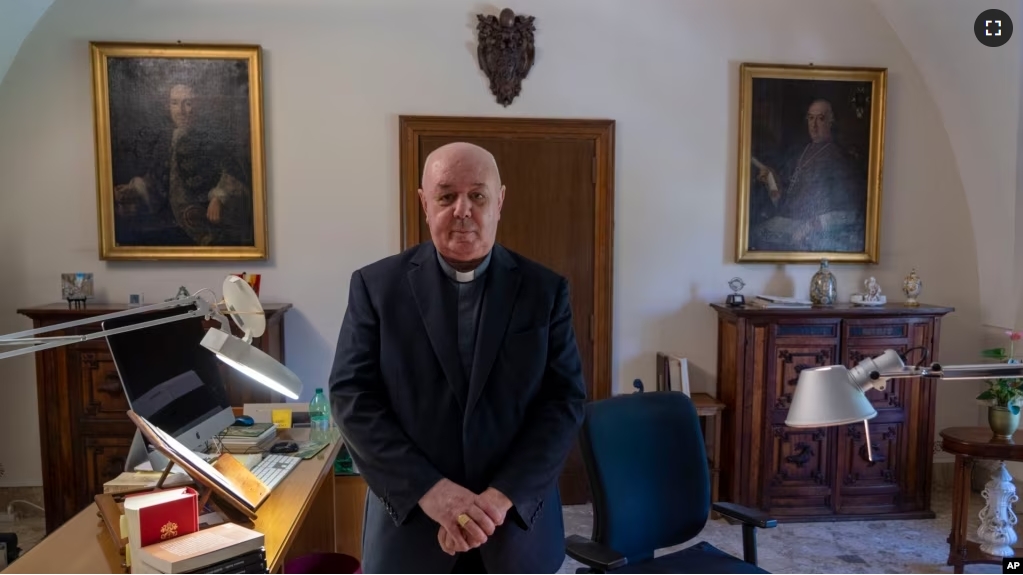The Roman Catholic Church has been trying for years to inform the public that its “secret” collection of documents is not secret.
The Vatican has opened documents of World War II-period Pope Pius XII to researchers. It even changed the official name of the archive to remove the word “Secret.”
Recently the chief of what is now called the Vatican Apostolic Archive, Archbishop Sergio Pagano, spoke to the Associated Press. Pagano told some of the secrets he had uncovered in the 45 years of working in the archive. The Vatican’s archive is one of the world’s most important stores of documents.
In a new book-length interview called “Secretum,” Pagano explained some of the largely unknown details of the history of the Vatican and its relations with the outside world over the past 1200 years.
The interviews took place as discussions over a year with Italian reporter Massimo Franco. Pagano explains everything from French leader Napoleon taking documents to the 1922 financial support for the election of a pope from Catholics in the U.S.
“It’s the first time and it will also be the last because I’m about to leave,” said Pagano who is 75. He also spoke to the AP before his expected retirement later this year.
Pope Leo XIII first opened the archive to researchers in 1881. Until then, it had only been used to serve the pope and preserve documentation of the head of the Catholic Church dating from the 8th century.
The archive has 85 kilometers of space for books, much of it underground in a two-story, fireproof secure area. It also holds documents from Vatican embassies around the world and collections from powerful families and religious orders.
The archive works much as any national or private archive would. Researchers request permission to visit and then request documents to study in reading rooms.
Most recently, researchers have been going to the archive to read through the documents of Pope Pius XII. He was the pope who has been criticized for not speaking out against the Holocaust during WWII.

Pope Francis ordered the documents of his office opened earlier than planned, in 2020, so researchers could have a full picture of the papacy.
In the book, Pagano criticizes incomplete research into the process of confirming the sainthood of Pius XII. Researchers are now examining newly available documents.
Aside from old stories, “Secretum” also shares new ones. They include an important financial relationship between Catholics in the U.S. and the Vatican that continues today and dates back to 1922.
Pagano said that after Pope Benedict XV died, a financial official found that the Vatican had no money. The book shares secret messages in which the Vatican asked its ambassador in Washington D.C. to send “what you have in the safe” so that the vote for a new pope could take place.
The messages say the Vatican embassy sent $210,400.09 collected from the American Catholics. That permitted the vote to elect Pope Pius XI.
Pagano suggests that Francis’ 2019 decision to remove the word “Secret” from the archive’s name and rename it the Vatican Apostolic Archive was possibly a choice to gain donations. The U.S.-based group Treasures of History is aiming to support the newly renamed archive.
At the end of the interview, Pagano showed visitors one of the archive’s prized possessions. It is the 1530 letter from British nobles urging Pope Clement VII to permit King Henry VIII to end his marriage, so he could marry Anne Boleyn.
Clement refused. Henry got married anyway. He broke ties with the Catholic Church in Rome and established the Church of England.
“You can say that here we are at the birth of the Anglican Church,” Pagano said.
Pagano explained how the document survived. He said when Napoleon Bonaparte, the ruler of France, took documents from the Vatican archives in 1810, the chief archivist at the time hid the letter.
“The French never found it,” Pagano said, showing that he believed an archivist’s main job is to preserve the archive.
I’m Gena Bennett. And I’m Gregory Stachel.
Nicole Winfield reported this story for The Associated Press. Gregory Stachel adapted it for VOA Learning English.
_______________________________________________
Words in This Story
archive – n. a place in which public records or historical materials (such as documents) are kept
interview –n. a discussion in which one person talks with another to get information to learn more about them or what they know
preserve – v. to keep (something) in its original state or in good condition
saint – n. a person who is officially recognized by the Roman Catholic Church as very holy and who is credited with holy acts called miracles
nobility – n. the group of people who are members of the highest social class in countries which observe such customs
